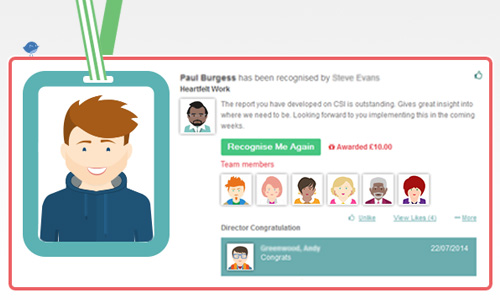Social Recognition. What Is It, And Why?
What is it? Simply empowering your workforce to capture the positives.
This may be living your values or the behaviours that underpin your values, internal and external customer service, and of course results and outcomes. Plus the intangible, social recognition is an expression about the people, and work experiences that make you proud and happy to work where you do, that connect you to what you do, that cannot be categorised, or measured by anyone, but you.
How does social recognition work?
It could not be easier, you see something you like, respect, admire or appreciate in a colleague or team. This may be going in the same direction as company objectives, or where you see a connection with company values, and you say what you think, and what you feel. Your recognition message or story, is instantly social across the business. Reward can follow, as can perks, time, awards, prizes, or not, depending upon how you see reward in your business. Social recognition has multiple reward mechanics built in, however the key is to make recognition 100% trust based, you give your employees a voice and the opportunity for positive expression.
Why are managers still key?
Firstly, the reason managers and directors have historically had to dominate the process is because of reward. Observing excellence or appreciating the small things is a human trait, not just a manager one. Social recognition pushes reward down the line and lets everyone in at the start. Recognition and reward are not the same thing, they never were.
Does social recognition dilute the role of managers? Quite the opposite, it is supporting managers, helping them out in a world that expects so much of them. Managers are being asked to improve patient care, drive productivity, take the blame for poor retention, the list goes on and on, and now they have to boost engagement?
Social recognition is important because it shifts the responsibility from managers doing all the recognition talking, or indeed no talking at all, as has happened historically. The best managers encourage you to find your own motivation, build strong relationships within their teams and have a strong sense of accountability. These managers are working hard to get to the point where their employees understand, and are focussed on objectives and values. An employee writing a short recognition story that hits the nail on the head, or captures something special, is where the best managers are striving to be. It also provides a great opportunity for a manager to add their own recognition or endorsement, and if they wish, reward.
The beauty of social recognition is that it supports managers in helping employees find their own motivational strengths and opportunities, while maintaining their own.
Why do I need my employees to lead the recognition conversation?
Employees need to see how they have contributed and the impact they have. That may seem small to the CEO, or for many organisations not worthy of reward, and so just ignored. But if I don’t get to see the difference I make, it is massive to me.
Social recognition ensures what I do well is captured, understood, and appreciated. If I get a small reward, even better, but an understanding and appreciation of my work comes first. Social recognition gives us that chance to look at what others have done well, and make sure it is noticed.
Why social recognition will play a greater role in HR strategy.
This is the era of: business values, workplace transparency, and trust. The things that you, your people, and your organisation do well matter more than ever. Unless you invest in your positives, package up what your employees are thinking and feeling, and start to show and celebrate exceptional work stories internally, you will generate little genuine appeal and trust to the outside world.
People, including your prospective employees and customers, are beginning to judge you on what you do, not what you say you do. Business values are no longer just words on the last page of your website. In the socially digital world, they extend way beyond the confines of your company, and your ability to show that you and everyone in your organisation lives by those values, is as crucial to engaging your future employees and customers, as it is to those who are engaged with you today.
Social recognition is authentic. It connects directly to every single member of your company; it aligns with your business objectives, and is a powerful motivator for the workforce of today.


 30 ideas to help a new starter in their first week
30 ideas to help a new starter in their first week
 The value of external feedback in the workplace
The value of external feedback in the workplace
 Expand the power of recognition with Partner Appreciation
Expand the power of recognition with Partner Appreciation